
When patients need some assistance coping with mental distress, consider these apps.
Fam Pract Manag. 2018;25(2):oa1-oa4
Author disclosure: no relevant financial affiliations disclosed.
Given the ubiquity of mobile devices, it makes sense that patients could use these tools to help them cope with or even prevent the symptoms of anxiety and depression. They may even ask you for recommendations. To help you guide patients to the most helpful apps, this article presents five that stand apart from the rest when reviewed using FPM's “SPPACES” criteria.
APP REVIEW CRITERIA
S — Source or developer of app
P — Platforms available
P — Pertinence to primary care practice
A — Authoritativeness/accuracy/currency of information
C — Cost
E — Ease of use
S — Sponsor(s)
7 CUPS
7 Cups uses trained, volunteer, active listeners to provide free, anonymous, and confidential emotional support to patients needing help coping with acute stressors and long-term mental health issues.
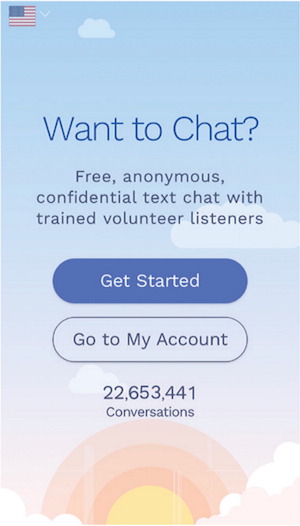
Source: 7 Cups of Tea, Co.
Platforms available: Android (http://bit.ly/2g0xDCv); iOS 7.0 or later for iPhone, iPad, and iPod touch (https://apple.co/2GH4kPe).
Pertinence to primary care practice: As primary care physicians, we are not always available when our patients need us most for their mental health needs. The 7 Cups app provides trained listeners 24 hours a day and approximately 300 free mindfulness exercises, cute online videos, chat rooms, and community forums.
Authoritativeness/accuracy/currency of information: The app was founded by licensed psychologist Glen Moriarty. All active listeners have to complete Moriarty's Active Listening Program and receive a perfect score on the quiz to participate. The service is completely anonymous and confidential. Patients can choose from more than 160,000 trained active listeners and licensed therapists based on reviews and a list of topics they specialize in, such as depression, bipolar disorder, anxiety, LGBTQ issues, breakups, bullying, or eating disorders. Each active listener is rated based on his or her helpfulness, professionalism, empathy, and response time, and is also given an overall rating. Unfortunately, not all active listeners are subjected to background checks. Users can choose a different active listener each time or the same active listener in order to develop a long-term, therapeutic relationship. Over time, listeners and users gain points and badges for being involved in the online community, which further motivates them to continue with the program. The app was last updated in September 2017 (Apple) and January 2018 (Android).
Cost: It is free to speak with volunteer active listeners. To speak with licensed psychologists, users can pay $12.99 per month, $94.99 per year, or $399.99 for permanent unlimited access.
Ease of use: It takes less than a minute to create an anonymous profile and start talking with an active listener. Users can search for a listener based on their age group and topics of specialty. The app is very intuitive, although it has some glitches, such as not being able to exit a video or meditation without accidentally opening and playing them, even with the phone muted. Also, there is no back feature to return to the main menu. The app is available in English only, although active listeners are available across multiple languages and countries.
Sponsors: None.
Rating:

7 Cups is an amazing outlet for patients struggling with mental illness and acute stressors to discuss their feelings with a trained, caring listener.
MOODTOOLS - DEPRESSION AID AND FEARTOOLS - ANXIETY AID
The MoodTools and FearTools apps provide patients with quick resources for tracking their cognitive distortions, activities, and safety plan in case of an emergency.
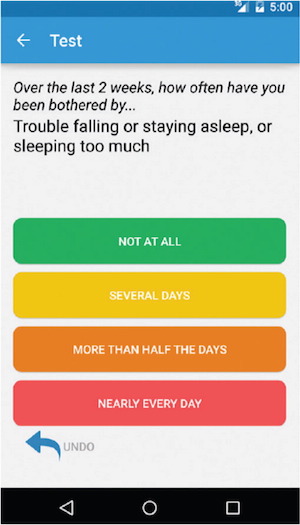
Source: MoodTools.
Platforms available: Android 4.1 or later (MoodTools: http://bit.ly/1i32IBH, FearTools: http://bit.ly/2F55QdM); iOS 8.0 or later for iPhone, iPad, and iPod touch (MoodTools: https://apple.co/2E8WEqy, FearTools: https://apple.co/2HgUbZW).
Pertinence to primary care practice: Many patients have limited access to psychiatric services, including therapy. To enhance the benefit from therapy, these apps allow patients to track their thought patterns and determine ways to challenge and reframe negative thoughts. Online videos also enable users to learn more about their illness and practice mindfulness.
Authoritativeness/accuracy/currency of information: MoodTools, which focuses on depression, and FearTools, which deals with anxiety, contain standardized screening questionnaires for patients to complete: Patient Health Questionnaire-9 for depression and Generalized Anxiety Disorder-7. Based on the screening, the apps recommend consulting a doctor or trained mental professional. MoodTools provides tips for sleeping or managing suicidal thoughts, while FearTools offers a workbook for dealing with anxiety and phobias. Both apps remind the user to retake the screening questionnaire every two weeks to monitor symptoms. The apps let users create thought diaries to record situations that cause negative thoughts and help them challenge those thoughts and replace them with alternatives. When patients are actively struggling with anxiety or depression, the apps offer guided meditations, breathing exercises, soothing sounds, relevant TED (Technology, Entertainment, and Design) Talks, and an individualized safety plan, all for free. The safety plan is created by the patient and includes his or her own warning signs, coping strategies, reasons to live, contacts, and places for distraction. The apps also can connect the user to a helpline or the nearest emergency department. App content for MoodTools was last updated in July 2017 (Android) and May 2017 (Apple), FearTools was last updated in June 2017 (both).
Cost: The app is free, but donations are accepted.
Ease of use: The apps' very simplistic layout and seamless transitions between screens creates a great user experience, although they are available in English only.
Sponsors: None.
Rating:

MoodTools and FearTools are essential, free cognitive behavioral therapy (CBT) apps for patients with anxiety, depression, or both. They are among the best apps I have used.
BOOSTERBUDDY
This app offers a novel way for teens and young adults to improve their resilience and work toward being healthier both physically and emotionally.
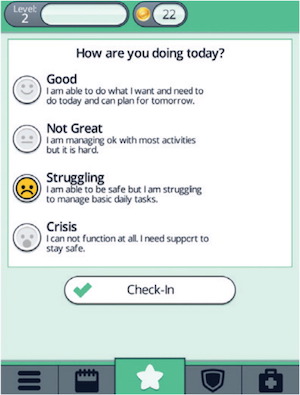
Source: Island Health.
Platforms available: Android 3.0 or later (http://bit.ly/2nEcdx2); iOS 8.0 or later for iPhone, iPad, and iPod touch (https://apple.co/2s9yHuv).
Pertinence to primary care practice: Pediatric psychiatric services are sparse across the nation. BoosterBuddy serves as a resource for teens, children, and young adults to track their mood and gain resilience. It encourages them to take their medications, go to their appointments, and learn coping mechanisms.
Authoritativeness/accuracy/currency of information: When users first launch the app, they can set up a crisis plan and choose an animated buddy. Each day, they can log their mood, accomplish certain “quests,” and report that they have taken their medications to wake up their buddy and gain coins. These coins can be used to buy clothes for the buddy. Quests may include tasks to increase motivation, sleep, or general wellness or to decrease oversleeping, overeating, depression, manic episodes, anxiety, voices, delusions, alcohol use, or drug use. The app was created by a health care system on Vancouver Island, but it is unclear who was involved in designing its content. It was last updated in December 2017.
Cost: Free.
Ease of use: It is easy to find and complete the daily quests and simple to add favorite coping methods for later use.
Sponsors: Coast Capital Savings and Victoria Hospitals Foundation.
Rating:

BoosterBuddy is a great app for kids to learn coping skills and monitor their mood.
SLEEPBOT
SleepBot is a quick and simple way for patients to log their sleep and improve their sleep hygiene.
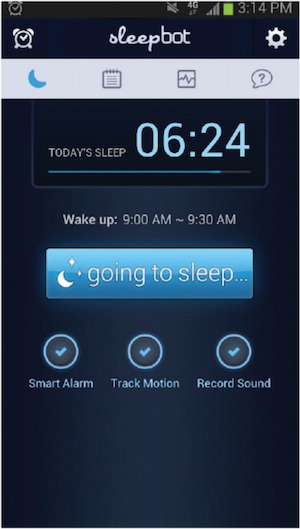
Source: SleepBot LLC.
Platforms available: Android (http://bit.ly/1o4Cejv); iOS 7.0 or later for iPhone, iPad, and iPod touch (https://apple.co/1G7wJqT).
Pertinence to primary care practice: Poor sleep is both a contributor to as well as a consequence of poorly controlled mental health issues such as depression, anxiety, and bipolar disorder. Improving patients' sleep habits can cause remarkable improvements in their mental health.
Authoritativeness/accuracy/currency of information: SleepBot tracks sleep quantity, movements, and sounds, and it also provides sleep hygiene advice. The app monitors the user's sleep as well as the desired sleep duration to determine the ideal time to wake the user. The app automatically saves the sleep data analysis to mysleepbot.com, and the user can export the data for easier visibility. When patients are struggling to fall asleep, they can view strategies to help them, including progressive relaxation, mind imagery, and journaling, as well as resources on things to eat, read, or do to help them fall asleep. SleepBot won the “Go Viral to Improve Health” competition hosted by the National Academies of Sciences, Engineering, and Medicine in 2011, and it has been featured on the Wired, Mashable, and Lifehacker websites. There is no mention of expert contribution to the app content, which was last updated in December 2013 (Android) and April 2016 (Apple).
Cost: Free.
Ease of use: To use the app, patients simply tap the “sleep” button and put their phone by their pillow. When they wake up, they tap the button again and the app logs their sleep. It is available in English and numerous other languages.
Sponsors: None.
Rating:

SleepBot is an easy-to-use app for patients to track and improve their quality of sleep.
WHAT'S UP? — MENTAL HEALTH APP
The What's Up? app helps patients monitor their mood and uses principles of CBT and acceptance commitment therapy (ACT) to help patients reframe their thoughts and cognitive distortions.
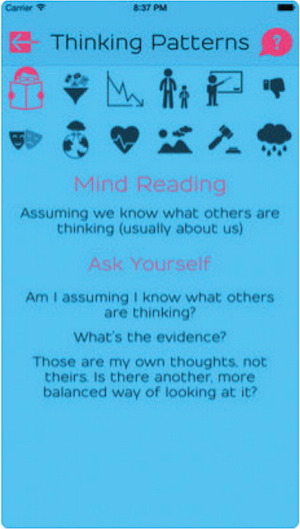
Source: Jackson Tempra.
Platforms available: Android 2.3.3 or later (http://bit.ly/2Ei9Rxd); iOS 6.1 or later for iPhone, iPad, and iPod touch (https://apple.co/2xbFAha).
Pertinence to primary care practice: Many providers do not have a background in CBT or ACT. This app gives patients some coping strategies to augment what they learn in therapy.
Authoritativeness/accuracy/currency of information: The app offers helpful strategies for acute anxiety and depression, including breathing techniques, questions to sidetrack what the patient is thinking about, an online community forum, uplifting quotes, exercises to keep patients in the present, and positive affirmations. Patients who want to gain insight into their own thinking patterns can explore the coping strategies tab, which describes various cognitive distortions, metaphors, worry management, and positive steps for increasing resilience. Patients can keep a diary in the app to track their moods, positive habits, and negative habits. The app can be password-locked for extra security. There is no mention online of the expertise or credentials of the creators of the app, which was last updated in August 2016 (Android) and December 2016 (Apple).
Cost: The app is free, but donations are accepted.
Ease of use: The app transitions flawlessly between menus, and its text and information are easy to read and understand.
Sponsors: Jackson Tempra.
Rating:

This is the perfect app for people looking to gain more insight into their thoughts and accompanying behaviors.
